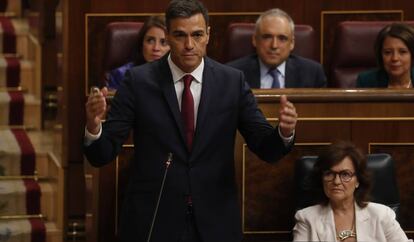Opposition calls into doubt doctoral thesis of Spanish prime minister
In the wake of the resignation of Health Minister Carmen Montón, focus has turned onto Pedro Sánchez’s academic record. The Socialist Party, meanwhile, is calling on PP leader Pablo Casado to quit

The resignation last night of Socialist Party (PSOE) Health Minister Carmen Montón set the agenda for a parliamentary session in Congress today, with the subject of the academic qualifications of Spain’s leading politicians dominating the debate.
Montón was forced to quit on Tuesday after press reports revealed a series of irregularities relating to a master’s degree that she had obtained from Madrid’s King Juan Carlos University. Despite insisting she had done nothing wrong, the university itself admitted that her grade had been changed manually, and revelations that her end-of-course thesis contained texts plagiarized from other articles freely available online and even Wikipedia forced her to quit.
There are reasonable doubts about your doctoral thesis. Why are you hiding it?
Ciudadanos leader Albert Rivera
This is not the first such controversy involving King Juan Carlos University. Former Madrid regional premier Cristina Cifuentes had to step down over irregularities in a master’s degree she studied there, while the Supreme Court is in the process of deciding whether the current leader of the Popular Party (PP), Pablo Casado, should be charged in connection with a similar degree that he received from the same institution.
The PSOE has called on Casado to immediately resign, something that he says he won’t do.
Today’s session in Congress began with the leader of the center-right Ciudadanos group, Albert Rivera, voicing for the first time doubts over the content of the thesis written by PSOE Prime Minister Pedro Sánchez, who holds a PhD in economics. “There are reasonable doubts about your doctoral thesis,” he said to the PM during today’s debate. “Why are you hiding it?”
Sánchez replied by saying that his thesis had been “published in accordance with the current legislation.” He stated that his work had not been hidden, and accused Rivera of turning the session into a “quagmire.”
The prime minister stated that his work had not been hidden, and accused Rivera of turning the session into a “quagmire”
Both the PP and Ciudadanos have been speculating in recent months over the authorship of Sánchez’s doctoral thesis, but had not, until today, voiced in public a request for him to make the document available for scrutiny.
The prime minister’s thesis is currently published on an online network controlled by the Science, Innovation and Universities Ministry, but it is not accessible to the public unless the author grants authorization.
The PSOE, meanwhile, today called for Casado to resign over his master’s degree. “The prime minister has nothing to hide,” said PSOE spokesperson Adriana Lastra in Congress. “The person who has a real problem on his desk today is Mr Pablo Casado. Casado must resign. The ethical requirements of our democracy have been exemplified by the resignation of Carmen Montón. This is the path that Casado must follow.”
The PSOE pointed out that Montón had quit despite not being investigated by the courts, unlike Casado, whose case is currently being reviewed by the Supreme Court.
Among the ranks of the PP, there was satisfaction that the spotlight has now been turned onto the credibility or otherwise of the prime minister. But on the other hand, they had to go to great lengths to explain why the PP leader shouldn’t also quit over the irregularities regarding his own degree, and tried to contain the damage by claiming that a doctoral dissertation is not the same as a master’s thesis.
English version by Simon Hunter.
Tu suscripción se está usando en otro dispositivo
¿Quieres añadir otro usuario a tu suscripción?
Si continúas leyendo en este dispositivo, no se podrá leer en el otro.
FlechaTu suscripción se está usando en otro dispositivo y solo puedes acceder a EL PAÍS desde un dispositivo a la vez.
Si quieres compartir tu cuenta, cambia tu suscripción a la modalidad Premium, así podrás añadir otro usuario. Cada uno accederá con su propia cuenta de email, lo que os permitirá personalizar vuestra experiencia en EL PAÍS.
¿Tienes una suscripción de empresa? Accede aquí para contratar más cuentas.
En el caso de no saber quién está usando tu cuenta, te recomendamos cambiar tu contraseña aquí.
Si decides continuar compartiendo tu cuenta, este mensaje se mostrará en tu dispositivo y en el de la otra persona que está usando tu cuenta de forma indefinida, afectando a tu experiencia de lectura. Puedes consultar aquí los términos y condiciones de la suscripción digital.








































